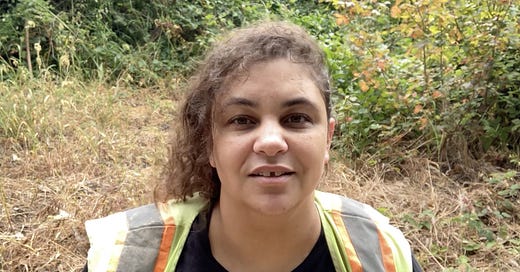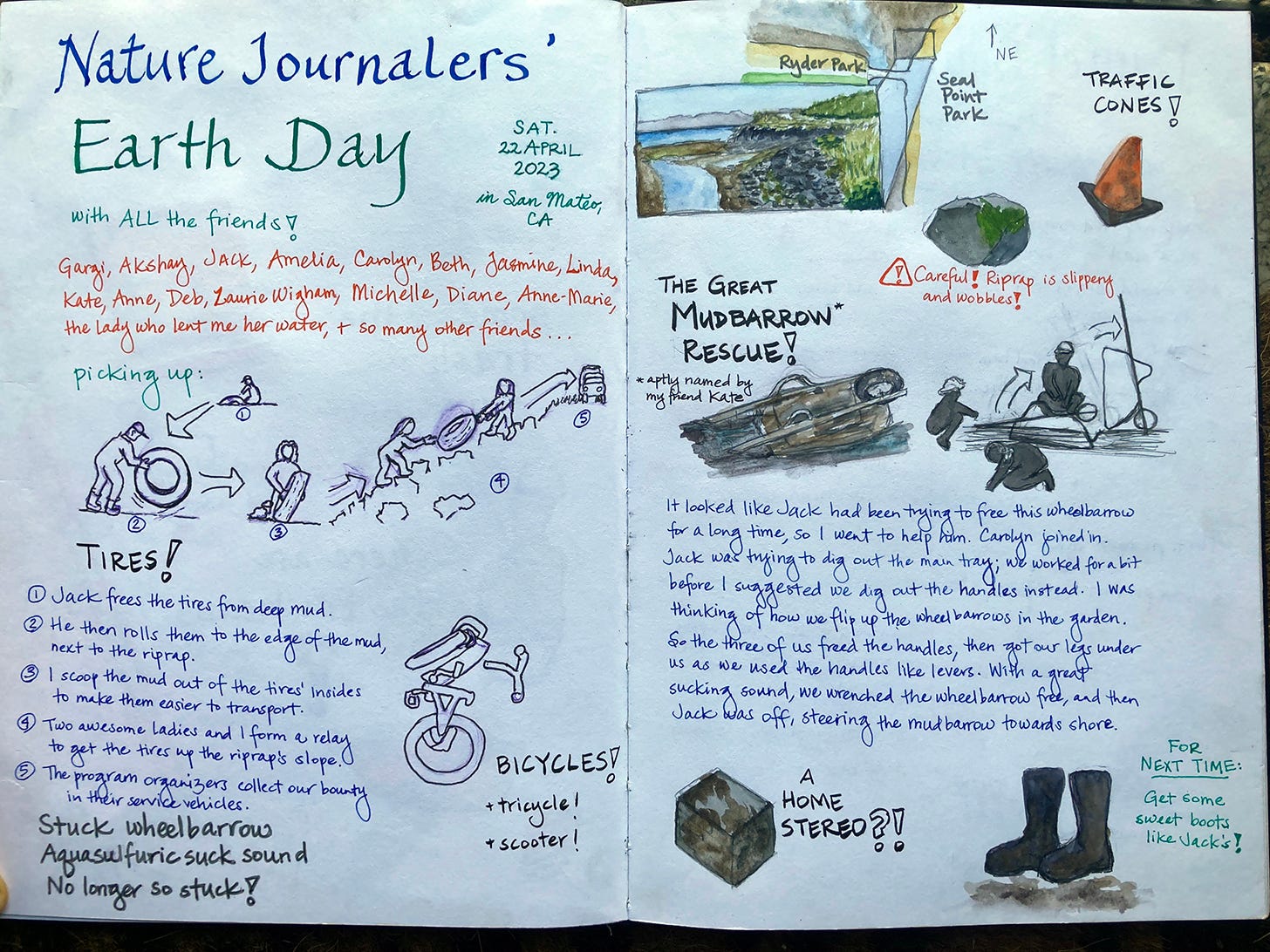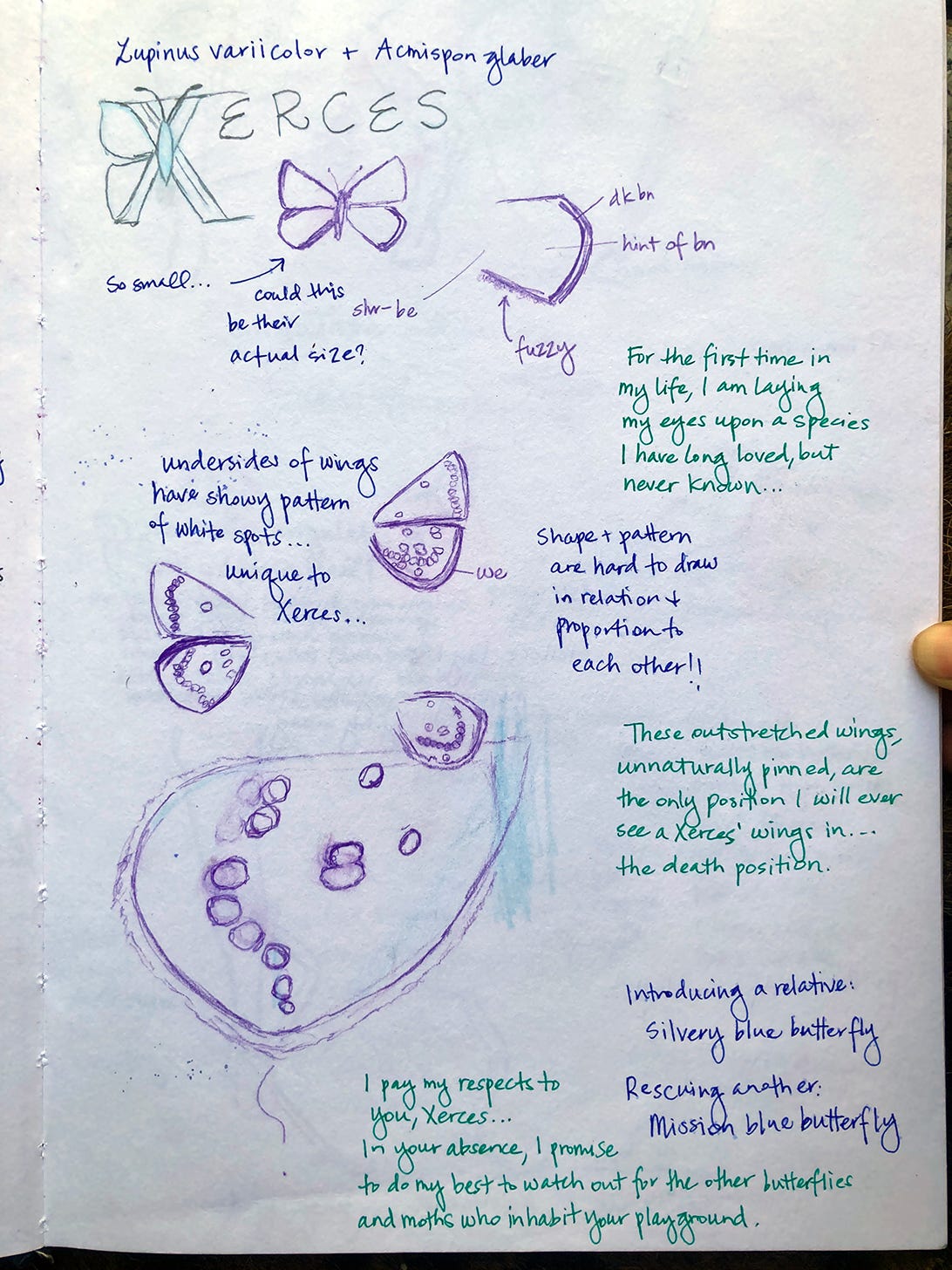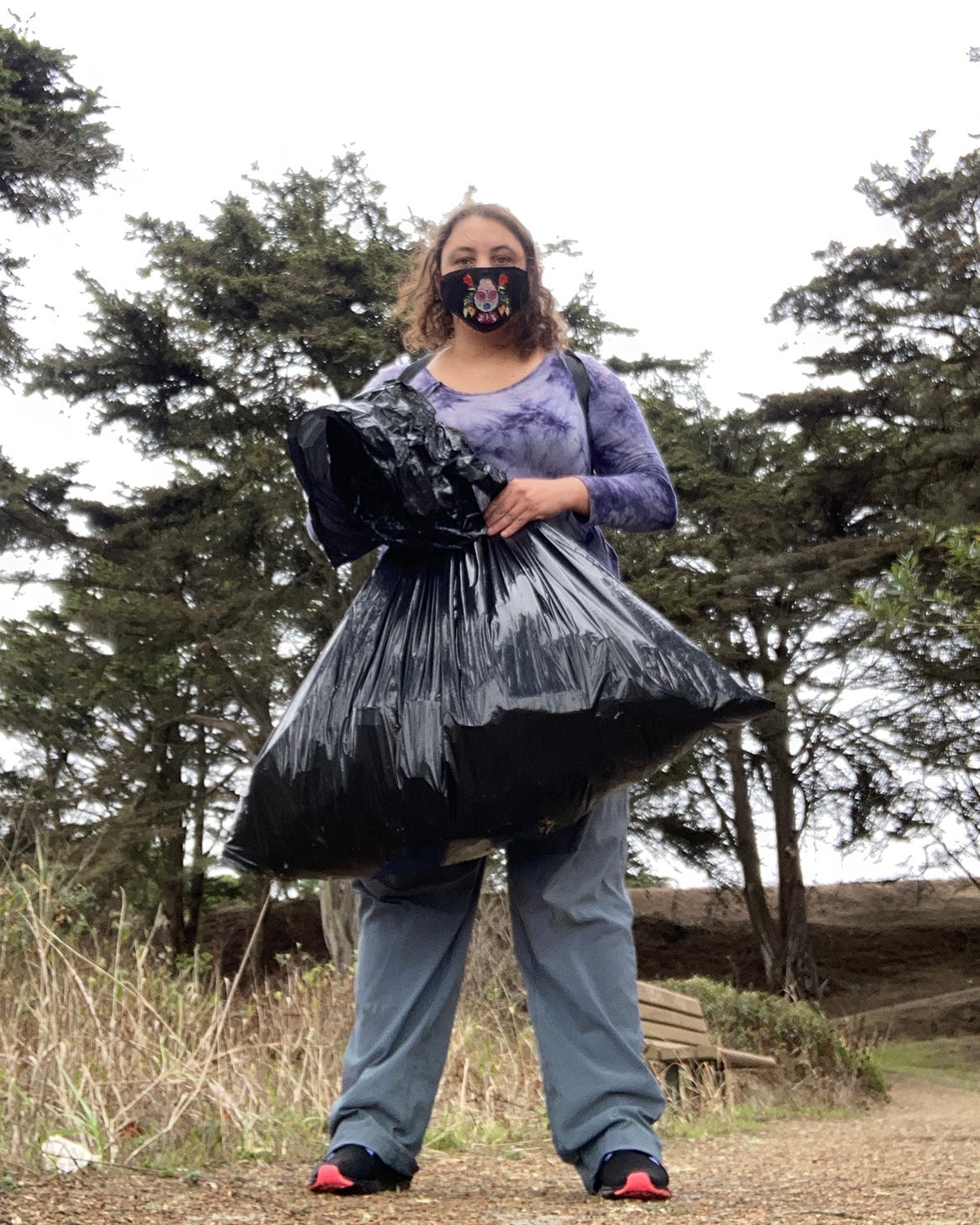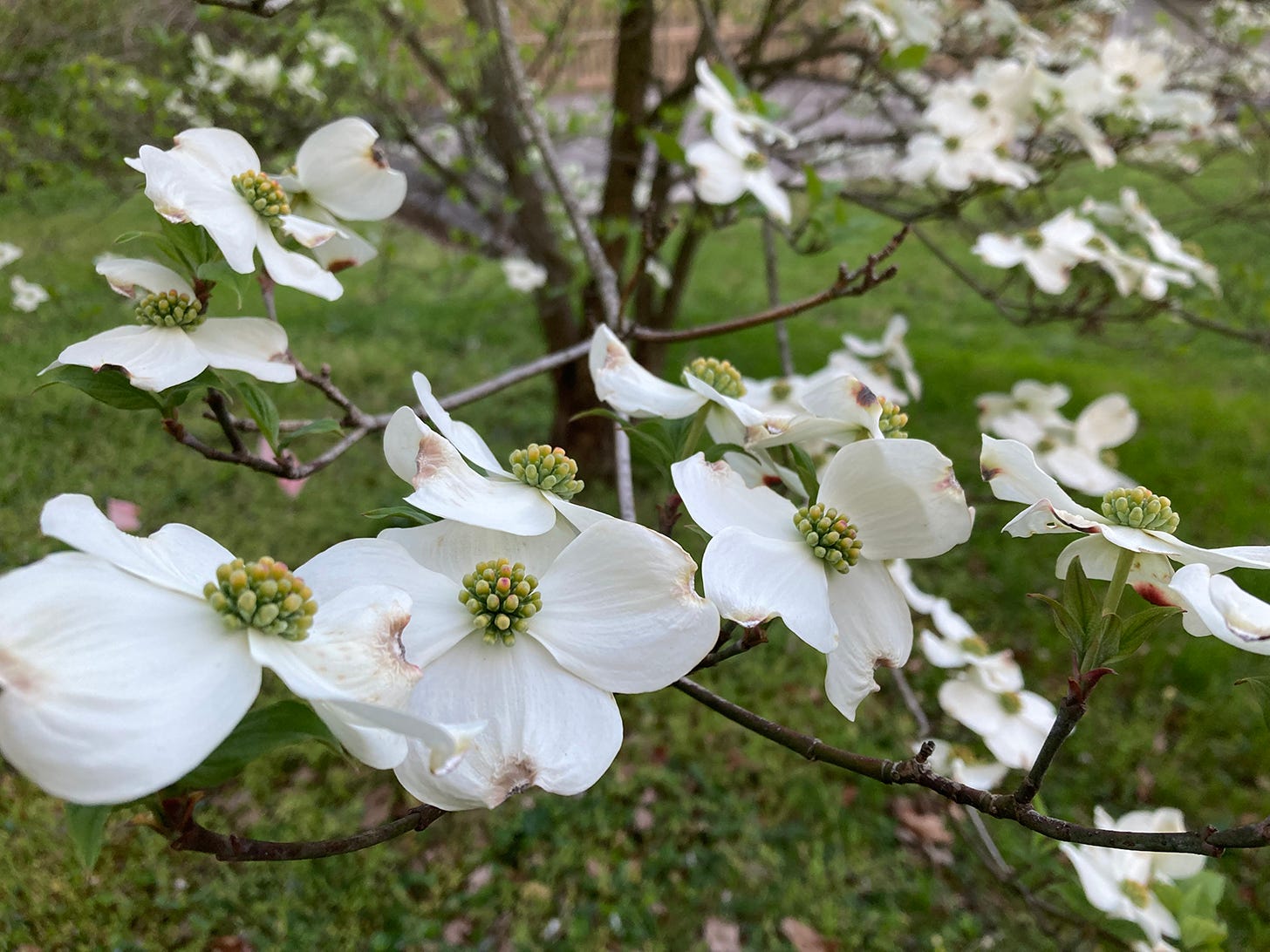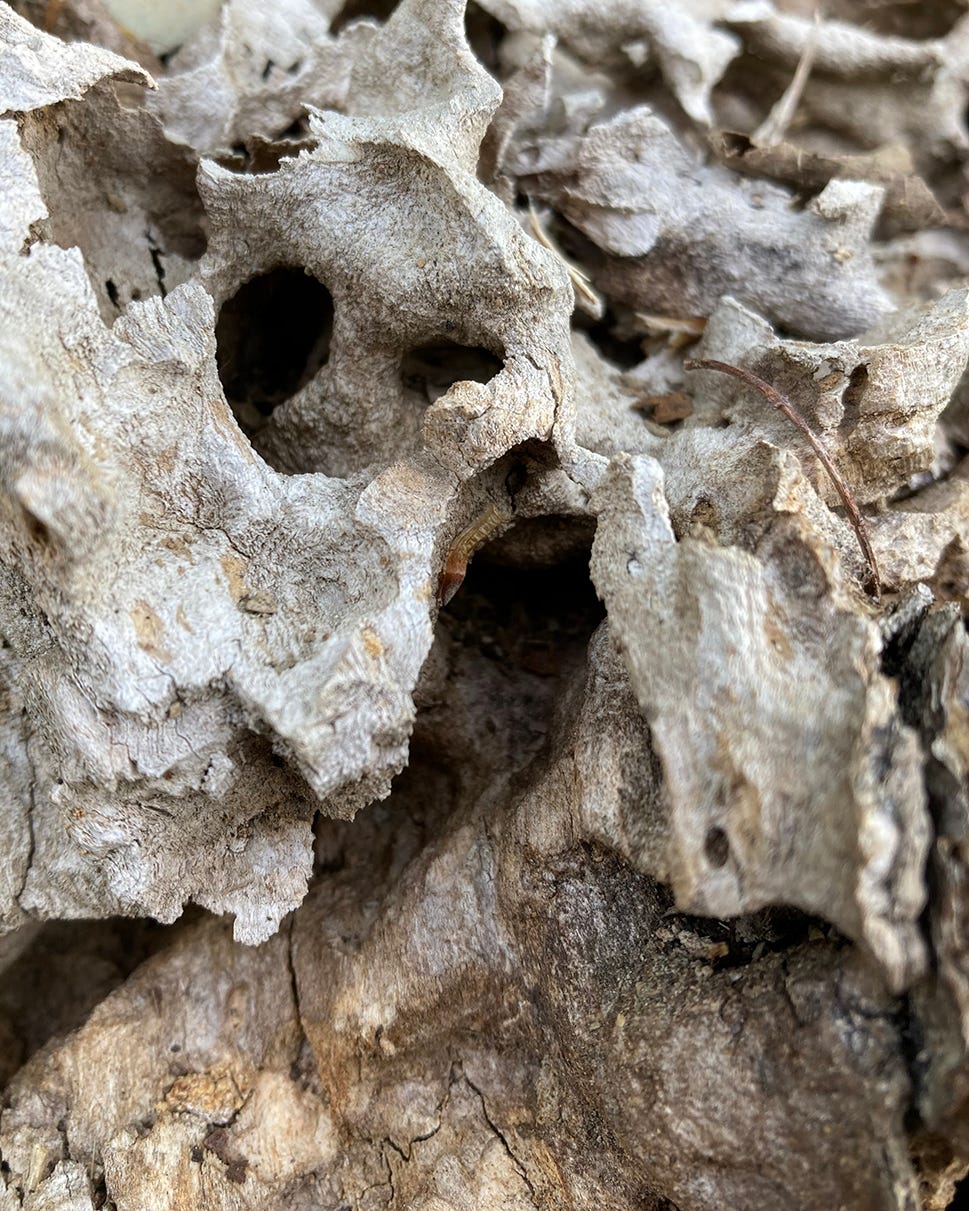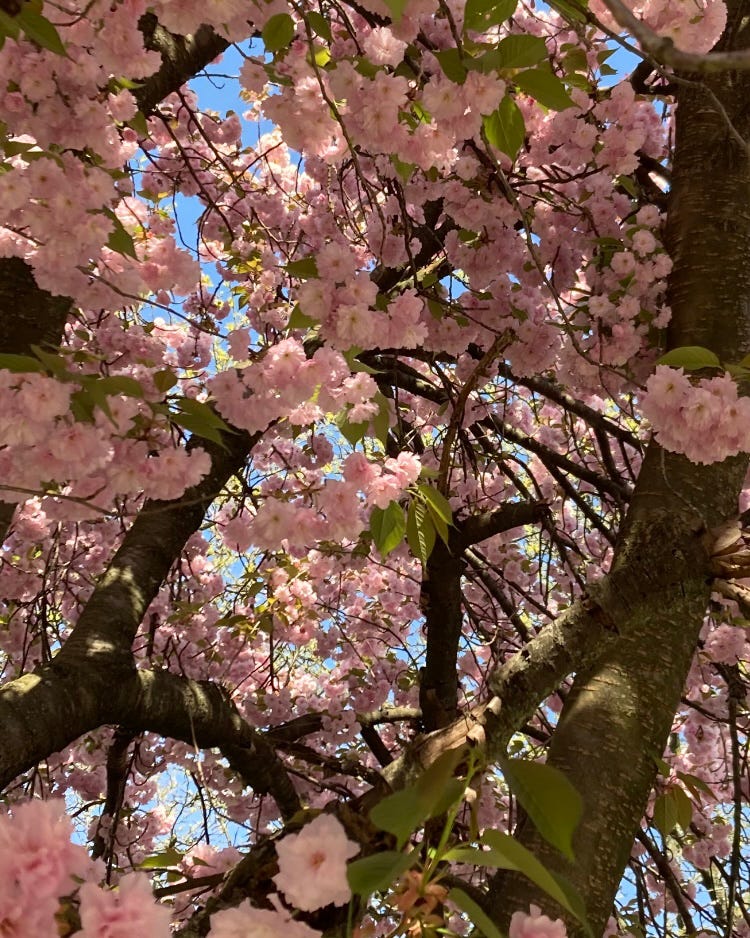On a trip to Zion National Park in 2018, I discovered The Laws Guide to Nature Drawing and Journaling, by John Muir (Jack) Laws. It’s full of examples and tips for drawing birds, insects, plants, and more. In early 2020 I discovered Jack’s twice-weekly online classes, and that was where I met Yvea Moore.
Yvea’s interest in ecological restoration caught my attention, as did her thought-provoking questions and observations. Her Pencil Miles & Chill sessions—a supportive nature journaling group, and a feature of the annual Wild Wonder Conference—are welcoming to all. Through her work cleaning up and restoring natural areas, Yvea builds community and encourages others to do the same.
Interview: Yvea Moore
What is the focus of the Wild Wonder Foundation, and how does it relate to the intersection of science, art, and writing?
Wild Wonder's focus is to encourage people to connect with nature through nature journaling and curiosity. The organization proposes an intersection of attention, curiosity, art, science, and community because these principles and skills build on each other. We connect more to nature (or any subject!) when we do it from an interdisciplinary perspective. Nature journaling is about observing nature and keeping a record of those observations—this can be done with both art and writing, because each of those "languages" can describe different aspects of our experiences
Who do you hope to reach?
We hope to reach everyone. Anyone is welcome to join us, as long as we practice our one rule of kindness to each other. There is a large community of educators within our global community who are dedicated to reaching participants of all ages and backgrounds. We are paying special attention to folks who might have been limited through economic barriers, under-representation, mobility challenges, and other obstacles in connecting with nature; we are currently working to increase practices and accessibility to offer more inclusivity.
What does the Wild Wonder Foundation offer that isn’t found elsewhere?
We offer a unique combination of different communities. Because of nature journaling's interdisciplinary applications, we have folks from several different backgrounds converging here, including artists, scientists, writers, photographers, students, travelers, naturalists, educators, biologists, birders, botanists, entomologists, mathematicians, beginners, and many others. Everyone has their own unique flavor of nature journaling, and all of it belongs equally. Our one rule is to be kind to each other, and because our founder John Muir Laws embodies that rule, our global community holds that tone of respect.
What projects are you most excited about right now, and why?
I am most excited about future applications of nature journaling to stewardship work and community science projects. Stewardship is my personal passion, in particular habitat restoration and trash pickups, so I am hoping to help further this endeavor and make stewardship more accessible to other nature journalers. I am planning to create a series of interview videos of other stewards in the nature journaling community so that folks will see how diverse stewardship activities and people can be, as well as how to document and celebrate our work. This series will be made accessible to the Wild Wonder organization and the greater nature journaling community.
Does the Wild Wonder Foundation partner with other groups?
The Wild Wonder organization recently partnered with the Amani Children's Home in Tanzania, as well as guides from Faces of Africa. A group of nature journalers, led by John Muir Laws and Billie Jo Reid, traveled to Tanzania to explore the Serengeti; they concluded their trip by giving the children at the Amani orphanage nature journaling supplies and going on a nature journaling outing with them. Their tour guides expressed an interest in keeping in touch with the orphanage, especially since an interest in nature and conservation might someday lead to job opportunities as tour guides for the children. The crew who traveled to Tanzania are currently discussing ways to keep in touch with the children's home.
Outside of your work with Wild Wonder, what do you do?
I am a community coordinator for the global nature journaling community. Among other things, I cohost weekly online workshops for John Muir Laws, edit and post his videos on his YouTube channel, lead an online community gathering called "Pencil Miles & Chill", occasionally teach class series about plant families, and do other behind-the-scenes work. I am also a long-term habitat restoration volunteer at a local site within the Golden Gate National Parks.
What aspect of your work has the most personal meaning for you?
Within the nature journaling community, two things are most meaningful to me: cohosting with Jack (John Muir Laws), and working to document my stewardship work with nature journaling. Jack is a dear friend, and I am so happy and honored to be supporting him on his endeavors to make nature journaling more accessible to everyone. Using nature journaling to document my stewardship work is hugely exciting to me, because I feel like this practice has the potential to grow globally. I love experimenting with different ways to record what I'm doing and figuring out how to make it accessible to others—my eventual hope is to model, teach, and inspire other folks how to document their stewardship work as well.
How are science, art, and writing part of your work, and how are the interactions between these areas important to you?
Thinking from a scientific perspective how habitat restoration works as well as what field techniques work best is paramount to informing what I do as a volunteer steward. I have to constantly be aware of my own understanding, which means taking in new information, analyzing it in light of older information, altering my understanding to fit the evidence of what I'm observing, and making better decisions. Science is the lens through which I modify my practices. Writing and art (nature journaling) are the ways I work out what is going on, as well as convey my work to other people. All of these pieces are essential to being a good steward, because I must seek to avoid potentially harming the ecosystem I mean to protect, and that means being as aware as possible of the effects of my own actions.
Is there a particular scientific/environmental problem that feels important to you? What do you do about that?
Ecosystem decline and lack of nature access are two extremely important issues to me. I do my habitat restoration work to make sure those ecosystems stay around and remain healthy and biologically diverse. I do trash cleanups to both help protect the environment as well as make nature more accessible to other people. I am especially concerned about communities living in polluted neighborhoods (environments) who might have been historically denied access to nature. How will people living in these communities be able to access nature when their own neighborhoods aren't safe or clean to be in, and when they feel prohibited and disrespected both at home and "out in nature"?
How does your identity and perspective affect your work?
I come from a mixed background. I would like to see more people of diverse backgrounds be able to access nature and feel safe, welcome, and cherished.
Who/what influences and inspires you?
I have had many teachers, mentors, and friends who have inspired me - my friends and mentors Jack Laws and Ernesto Pepito come immediately to mind. I have also been lucky to have access to a lot of diverse books, especially children's books, that feature people of all backgrounds out enjoying nature. The books normalized for me that nature is for everyone, that everyone can find belonging in nature, and that cultural identity can be honored in nature connections. They also are super helpful for when I'm having trouble drawing something - I can look at the different art styles of the illustrators and be inspired! A great thing about children's books is that no two art styles are the same, so whatever your own personal style is, it's valid. One more thing - nature's ridiculousness inspires me. Seeing something silly like a red-tailed hawk being chased by an Anna's hummingbird, or getting high-fived in the face by a native California rose I'm trying to protect, reminds me not to be too serious and instead remember that a big part of existing in the world is having fun!
And now, a question from Derek Russell, who was featured in the Mentorship and Conservation issue of Twig & Ink. Derek asked: What sort of mental or social barriers have you encountered when advocating for the relationship between art and science? How did you overcome them?
I have disabilities, and they affect how I express myself, the amount of energy I have to take on certain tasks, and how much access I have to certain programs and nature areas. My disabilities, gender, and ethnicities have also affected how much my voice is heard and recognized, especially when other voices might be louder or more charismatic. I overcome these barriers by being as realistic as possible about what I am able to do today, and also finding or making ways to access what seems out of reach. Many times it involves setting up smaller goals until I can reach the big ones, changing or combining strategies, knowing who to ask for help, and most of all knowing when to step back, listen, and validate others before speaking. I love this question and would love to hear others' answers!
Anything else you’d like to say?
Be creative! Creativity isn't solely for art and writing—it can be found in science too when you consider which questions to ask, how to go about answering them, who gets to answer them, and how to dig beyond what you have already explored. It can be found in how you go about living life, how you solve problems, and how you celebrate our world.
Learn more about Yvea and her work here:
On Marley Peifer's Nature Journal Show about Habitat Restoration
On Bethan Burton's Journaling With Nature podcast about Stewardship and Restoration
Branching Out
Rooted (Stuff I like, maybe slightly off topic.):
I first discovered Hara Woltz in this beautiful article from Orion magazine. I return to her work periodically and always find something new that interests me.
Rounded (Preview of coming attractions.):
My older daughter has had some amazing opportunities at College of the Atlantic, a school that truly encourages and supports interdisciplinary studies!
Reaching (A question for you!):
What’s something about your science/art/writing practice that you enjoy?

